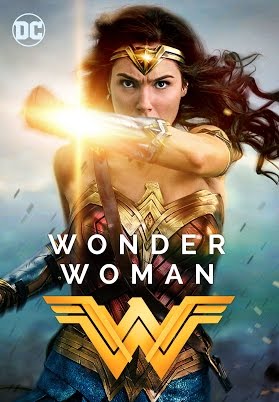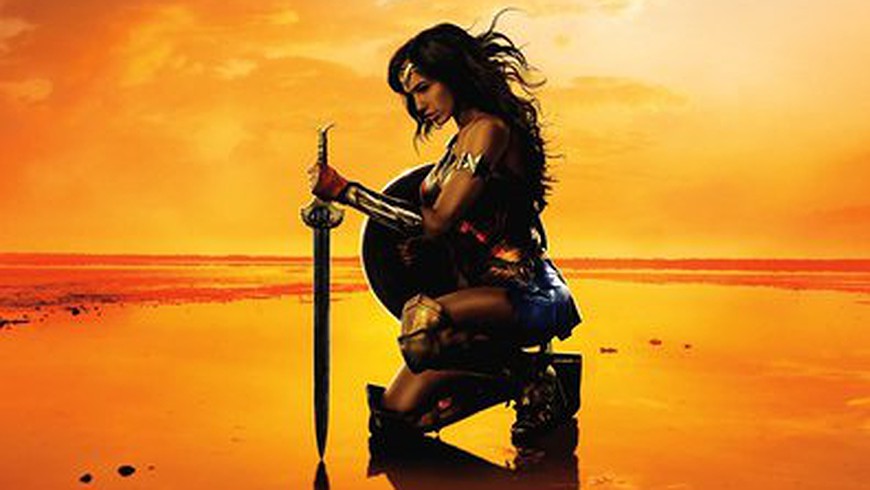Wonder Woman
Sinan Güzel
This essay will compare feminist theory and mythic approach of the movie Wonder Woman (2017) by Patty Jenkins. Wonder Woman has some powers as a gift from gods and she uses her powers to save humanity. This essay will help how Wonder Woman sees feminism and self - discovery being a mythic character herself. As a mythic character, Wonder Woman, discovers herself and at the same time discovers people seeing how she is different from the society where she comes from. We can understand feminism with these differences.
When Wonder Woman is a young girl she always escapes from her teacher and goes to an arena where girls’ armies practice. She wants to learn how to fight to defend herself but her mother doesn’t want her to learn how to fight as most mothers. Mothers don’t want their daughters to learn to fight or defend themselves. Thus, they always need a man to protect themselves. However, Wonder Woman learns how to fight from her aunt secretly. This girl doesn’t need someone to protect her. Chrysanthi Nigianni said, “Freedom is strongly linked to the Notion of free will and capacity for self-determination: a free subject is the subject who is capable of determining his / her own actions by making choices. Against this notion of freedom, in dissociable from the idea of determination, Deleuze posits an ontological freedom as indeterminacy[1]” Girls need to struggle to gain their freedom and they need to have power. Thus, they must work for his power and Wonder Woman has worked hard to gain strength. She always escapes from her teacher and she goes to her aunt to learn how to fight.
When she is a grown-up person an airplane crashes into the sea. When she sees this, she goes near the airplane. She sees a man inside the airplane and rescues him. Wonder Woman hasn’t seen a man before in her life. She lives on an island where only women live. Then she brings him to the beach. After this, soldiers follow him, come to beach and they attack the “Amazon Girls”. After the fight Wonder Woman learns that the outsiders need help and wants to go to help other people to do her duty. “The construction of a collectively suitable persona means a formidable concession to the external world, a genuine self-sacrifice which drives the ego straight into identification with the persona. The “soullessness” of such an attitude is, however, only apparent, for under no circumstances will the unconscious tolerate this shifting of the center of gravity.”[2]
She wants to discover her own character outside in the real world. Also being a mythic character she has a duty to protect all people from the Ares. She thinks that Ares is responsible for the war in the outside world and she wants to go and fight with Ares. If she kills Ares she might finish the war. She escapes with him from the island to the outside world. Then she tries to find a new identity for herself. When they go to London they go to the parliament building. When a man says to her, “You should stay here”, she ignores him and steps inside. In the council all people are men. When they see a woman inside, they are surprised and become silent. A woman cannot go inside the council. Women are not allowed in the country council and women don’t have a right to say anything about their country. This scene may represent women should be everywhere and they may think better than men. Women and men should be equal. When they hangout in London they go to shopping to buy a dress for Wonder Woman because she looks weird in her own outfit. When she buys something, she wonders how these women fit into this dress that she has never worn before. Women are not just housewives. They are not just beauty objects in good dresses. They are more than that. They can fight, they can teach, and they can do everything.
Wonder Woman sees being a secretary the same as being a slave. Being a secretary is contemporary slavery because you always do what they tell you to do, and you always obey the rule and don’t do anything to change anything. “Jung’s concept of individuation involves the integration of unconscious material into conscious awareness, which results in a more expansive and balanced human experience. “Wholeness consists in the union of the conscious and the unconscious personality,” he wrote, and the biological “signs” of each gender determine the quality unconscious images will take when they seep into consciousness. “In the psyche it is only the conscious mind, in a man, that has the masculine sign, while the unconscious is by nature feminine. The reverse is true in the case of a woman” [3] Men think women are weak but it is not true. Women can do everything just like men. Wonder woman can see women fight even better than men. Men don’t want to see this. They ignore women and say women and children must be protected and they must be rescued from the war zones. Women accept this. İf women do not accept this and they fight for their freedom, their power, they can protect themselves from dangers.
The bar scene in the film is an example to women are strong like men, too. When a boy says, “this little lady is crazy and cannot come with us” a man tries to shoot some of them and Wonder Woman fights with him to protect her friends. Then these men surprised because this Wonder Woman punches him in the face. After some silence they agree that Wonder Woman can go with them to the war place. War places are not for ladies. Women should learn how to be free and how to get their freedom. Chrysanthi Nigianni said, “Accordingly, the power of decision, the problems we pose, are not merely ours, there is an-other who ‘writes’ our destiny: not God, or any transcendent, vertical Being (any vertical transcendence is abruptly rejected by both Deleuze and Guattari as non-philosophy), but the other as potentiality and virtuality played out by chance, incarnated by the very possibility of having the dice thrown once more, thus affirming once again freedom as indeterminacy (any combination is possible), which precedes the social and subjective (hierarchical) determination of the self. Restricting the idea of freedom to the capacity for determination limits it to a subjective condition which ultimately impoverishes it rather than affirming and enhancing it. Freedom like thought is not ours; it is beyond and before us and we are constituted within it. Thus ‘we must steal our freedom”[4]
“Every gift is a sacrifice.” A.Tarkovski[5] Wonder Woman gives a gift to people but she sacrifices her own life and she has to forget her family. She gives people freedom. She doesn’t know whether they deserve it or not. She cannot go back home; she starts protecting them. And the other sacrifice is the death of the spy who watches Wonder Woman and she goes to death in the sky.” The ultimate gift cannot be other than death, since death does not have inequivalent to be exchanged with and all the more, ruins even the expectation of a future return as it signals the end of empirical time. Therefore, sacrifices the gift that violates the established order of things, the economy of accumulation and preservation, the economy of ‘being’ based on a linear conception of time, the morality of utility”[6]
Wonder Woman must discover herself. And she discovers humans too and humans are different from her former perception of them. She discovers the good in a new world that is different her island. She sees humans and what they do. They aren’t controlled by anyone. Wonder Woman always wants to believe in humans because she always has hope.

ARTICLES
Antonia Felix, Wichita State University, Kansas, USA Lost in Individuation: Elements of Archetypes and
Individuation in Sofia Coppola’s “Lost in Translation”
Chrysanthi Nigianni Becoming-woman by Breaking the Waves
[1] Chrysanthi Nigianni Becoming-woman by Breaking the Waves p.111
[2] Antonia Felix, Wichita State University, Kansas, USA Lost in Individuation: Elements of Archetypes and Individuation in Sofia Coppola’s “Lost in Translation” p138
[3] Antonia Felix, Wichita State University, Kansas, USA Lost in Individuation: Elements of Archetypes and Individuation in Sofia Coppola’s “Lost in Translation” p136
[4] Chrysanthi Nigianni Becoming-woman by Breaking the Waves p112
[5] Chrysanthi Nigianni Becoming-woman by Breaking the Waves p120
[6] Chrysanthi Nigianni Becoming-woman by Breaking the Waves p122
previous
article
next
article Twitter Google Plus Facebook
